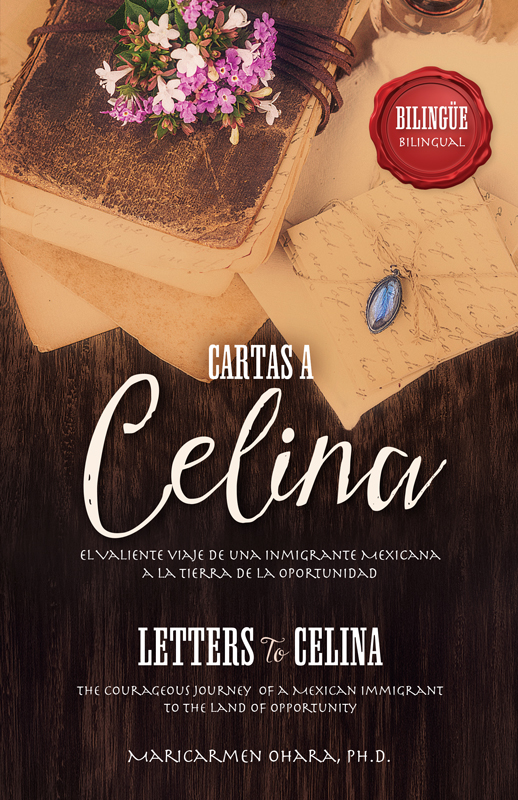ABOUT AUTHOR
Maricarmen Ohara
I was born in Trinidad, Bolivia, the daughter of a Japanese immigrant and a Bolivian lady.
Thanks to the hard work of my parents, my siblings and I had a good life and an adequate education. Nevertheless, it is impossible to ignore the penury of others. My sister Dori and I vowed to do our best to help our people and in 2005 we started a program of monthly contributions delivered to four key entities through our brother Carlos, who resides in Trinidad. In this manner, THE OHARA BOLIVIAN CHILDREN FOUNDATION was instituted and was granted non profit public benefit corporation status on September 19, 2006 by Bruce McPherson, Secretary of State, State of California, U.S.A.
When I published ASK LUZ in November 2015 I vowed to donate most of the proceeds of the sale of this novel to the children of my home town, Trinidad, a forgotten place in Bolivia.
Current Books
Letters to Celina
The courageous journey of a Mexican immigrant
to the land of opportunity.
Carmen Garcia
A bilingual play.
Inspired by Georges Bizet’s opera CARMEN.
By MAricarmen Ohara
Cartas a Celina
Letters to Celina
The happy and carefree life of 19-year old, upper class xalapeña Celina Madrigal-Faurè, comes to a schreeching halt when her father dies of a heart attack. With her family facing poverty, the only solution is for her to go up North, undocumented.
After the dangerous crossing to California, a totally new set of challenges faces the inexperienced young woman. Alone in San Buenaventura, the City of Good Fortune, she supports her family by working in the most humble occupations — house cleaning, babysitting, short order cook and waitress.
Celinas journey into the dierent social layers of American society involves a traumatic event that lands her in a Womens Shelter. Undefeated, she never loses track of her mission. In due time, she fullls her dream of nding true love and also helping other Latinos in an advice column which she names Letters to Celina.
By MAricarmen Ohara
Carmen García
Drama en Doce Actos y Nueve Escenas
CARMEN GARCIA es un drama escrito en versiones en español e inglés. Inspirado en la ópera CARMEN de Georges Bizet, relata la historia de Carmen García, una hermosa inmigrante mexicana de 18 años. Huérfana de padres, sufre experiencias traumáticas en casas-asilos que la tornan en una joven rebelde y desconada. Reintegrada a la sociedad hispana, dentro del contexto ambiental estadounidense, se siente odiada por las mujeres y codiciada por los hombres, y solamente encuentra desahogo en la música y el baile.
Su desconanza y amargura se tornan en amor y afecto cuando conoce a José Navarro, un joven que, obligado por su madre, estaba a punto de casarse con una acaudalada heredera. Los dos jóvenes se aman profundamente y aspiran a pasar sus vidas juntos.
La adversidad los separa de un modo equívoco y brutal. Carmen es rescatada por Chinita Méndez, una joven mexicana de padre japonés. Chinita es una exitosa diseñadora de modas y emplea a Carmen. Además de ayudarla a a recuperase de sus heridas físicas, la consuela por la pérdida de José. En la escena diez, Carmen se entera de que sus penas e infortunios no son únicos, que otros también han sufrido tremendas injusticias. Una de éstas es la revelación de que la abuela de Chinita nació y pasó su infancia en un campo de concentración en Manzanares, Estados Unidos, durante la Segunda Guerra Mundial, cuando los japoneses nacidos y criados en el país del Norte, fueron aprisionados y enviados a lugares alejados después de que el gobierno norteamericano les quitara todas sus posesiones. El drama mezcla eventos dramáticos con música y danza. Músicos y cantantes como Celia Cruz y Luis Miguel interpretan los ritmos llenos de sabor que son parte del alma latina y que contribuyen a la gran celebración final.
BACKGROUND
I was born in Trinidad, Bolivia, the daughter of a Japanese immigrant and a Bolivian lady. Thanks to the hard work of my parents, my siblings and I had a good life and an adequate education. Nevertheless, it is impossible to ignore the penury of others.
My sister Dori and I vowed to do our best to help our people and in 2005 we started a program of monthly contributions delivered to four key entities through our brother Carlos, who resides in Trinidad. In this manner, THE OHARA BOLIVIAN CHILDREN FOUNDATION was instituted and was granted non profit public benefit corporation status on September 19, 2006 by Bruce McPherson, Secretary of State, State of California, U.S.A.
When I published CARTAS A CELINA in November 2015 I vowed to donate most of the proceeds of the sale of this novel to the children of my home town, Trinidad, a forgotten place in Bolivia.
TRINIDAD, BOLIVIA
The city of Trinidad (the Most Holy Trinity) was founded in 1686 by a Jesuit priest, Padre Cipriano Baracé, on the shores of the Mamoré river. Later on, in 1769, pestilence and floods along the riverbanks caused the city to be relocated on the shores of Arroyo de San Juan. Trinidad is the capital city of the department of Beni with a population of approximately 100,000 inhabitants and it is located at an altitude of 237 meters above sea level. It has a tropical and stifling climate, regularly hot all year-round. It is one of the most forgotten parts of Bolivia. It has taken 320 years for a limited amount of progress and technology to arrive in this dusty, perpetually hot and humid city where financial resources are scarce. Education, social and health programs are few and insufficient. Poor children and old people are especially hard hit by adverse circumstances and they depend heavily on the generous contributions of a few dedicated people.
PRESENT FOUNDATION WORK
We have focused our efforts in helping four different local groups in Trinidad:
a. Children who live in the local prison. Pope Francis I recognized this horrendous situation while visiting prisons in South America in 2015. Bolivian law allows a prisoner to reside in jail with his family. This has created a subculture of inhuman poverty in which children are subjected to hunger, illness and other social problems. Two nuns from the local girls school, “Colegio Madre Seton,” assist the children by providing breakfast and some medicines.
b. Children who live alongside the Mamoré River (an affluent of the Amazon River) are difficult to help since they are scattered along the long stretch of the river which periodically suffers heavy flooding. An American nun, Sister Geralda McClosky, has spent most of her life traveling along this river assisting those children, instituting school centers where the kids can live and study. Most of our contributions go to this project since food in those parts is difficult to obtain.
c. Another portion of our contribution is given to “Sedeges,” Trinidad’s local social service agency which supports two separate orphanages. Conditions in these two places are primitive but at least the children are assured food and shelter.
d. A fourth part of our contributions is given to Father Adam Bravo Mendoza who runs a lunch service from Monday through Saturday for 120 elderly poor at the Santa Cruz parish in Trinidad.
Our contributions have been acknowledged through official letters, photos and also receipts that document the use of the funds.
GOALS OF THE FOUNDATION
Financial: We would like to expand the level of support and provide for a more stable financial basis that assures a constant flow of monies. I have dedicated the entire future proceeds of my novel CARTAS A CELINA to this end.
Tax incentives: By incorporating our Charity and registering with the Federal Government, we can enable donors to take advantage of tax deductions. We were granted non profit public benefit corporation on September 19, 2006 by Bruce McPherson, Secretary of State, State of California, U.S.A.
Infrastructure: Our eventual goal is to build and support a vocational school-orphanage in Trinidad for 100 or more children.
Minimum overhead. Our goal is to limit expenses to a maximum of 2%.
I.R.S. REGULATION 501(C)(3)
NON-PROFIT CHARITY CORPORATION
I.R.S. FEDERAL I.D. 20-5807568
For additional information and donations please contact Maricarmen at 805) 258-9653 – email: mcohara15@gmail.com
Page design by Ruben Acevedo







